CHAOS
The Most Ruinous Power
Chaos also known to its servants as the Primordial Truth or the Primordial Annihilator, and to the Imperium of Man as the Archenemy, is the universal and usually malign metaphysical force embodied by the malevolent intelligent entities comprised of psychic energy that live in the Immaterium. The entities who embody Chaos are mostly daemons, but the term also encompasses those mortals who have thrown in their lot with Chaos, ranging from simple peasants and/or manufactorum labourers who serve as Chaos Cultists, to Traitor Imperial Guardsmen, planetary militia, Imperial nobles, Planetary Governors, and even the mighty Chaos Space Marines and Traitor Titan Legions of the Dark Mechanicum.
Chaos is also itself the turbulent psychic energy that comprises the alternate dimension known as the Immaterium and gives shape to the nightmare domains of the individual Chaos Gods that are collectively called the Realm of Chaos by savants of the Inquisition. Chaos is almost synonymous with the Warp -- the two concepts are inseparable, for Chaos is the limitless ocean of spiritual, psychic and emotional energy that defines the Immaterium and underlies the 4-dimensional material universe of space-time. Chaos is a great and raw force of change and power, and is both physically and spiritually corrupting, though it is not in itself necessarily "evil."
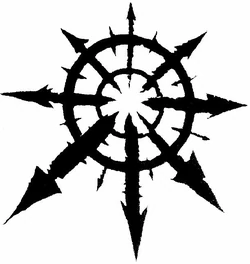
Because Mankind is by far the most populous intelligent species in the galaxy of the late 41st Millennium, the Chaos Gods particularly embody Humanity's myriad and particular flaws as a people. Chaos corrupts Mankind so easily because it speaks to the character flaws inherent in every man and woman and seeks to exploit the weaknesses of their all-too-human natures. It takes an extraordinary individual of truly iron will and selflessness to resist the serial temptations of Chaos. It is also these inherent character flaws that produce the rampant physical and anatomical mutations of individuals exposed to Chaos energies, as these mutations are driven by the inner flaws of the person's psyche being made manifest in their physical person as Chaos bridges the gap between the Immaterium and realspace. With all the obvious dangers associated with Chaos, such as mutation, daemonic possession, and spiritual damnation, some might wonder why anyone would willingly choose to serve the Ruinous Powers. The answer is actually simple. Chaos judges its servants solely on their abilities and their records of success and failure in promoting the agenda of the individual Chaos Gods and of Chaos Undivided as a whole. Chaos also offers those who serve it the opportunity to perhaps one day wield power and respect far beyond the dreams of most mortals' avarice. For so many people, but particularly in the oppressive, feudal Imperium of Man, where too often family connections and inherited wealth are rewarded rather than ability, and where it is impossible on many worlds for a talented individual to ever better their lot, Chaos actually offers a substantial degree of freedom and the only real meritocracy that they have ever known. But Chaos is not a benevolent force, and for the vast majority of those who fall to Chaos' temptations, they will never reach either power or position and will be little more than faceless puppets in the endless schemes of the Dark Gods. While Chaos may reward success with power, even the mightiest Chaos servant becomes a slave of Chaos, never its master. Most who serve Chaos will fail in their quests for power, eventually ending up as possessed Daemonhosts, mindless Chaos Spawn, or simply as just another corpse in the heap, a pawn whose usefulness to the Ruinous Powers has ended.
Khorne
Khorne also called the Blood God and the Lord of Skulls, is the Chaos God of blood, war and murder. His domain covers the most basic and brutal of sentient emotions and actions, such as hate, anger, rage, war and killing.
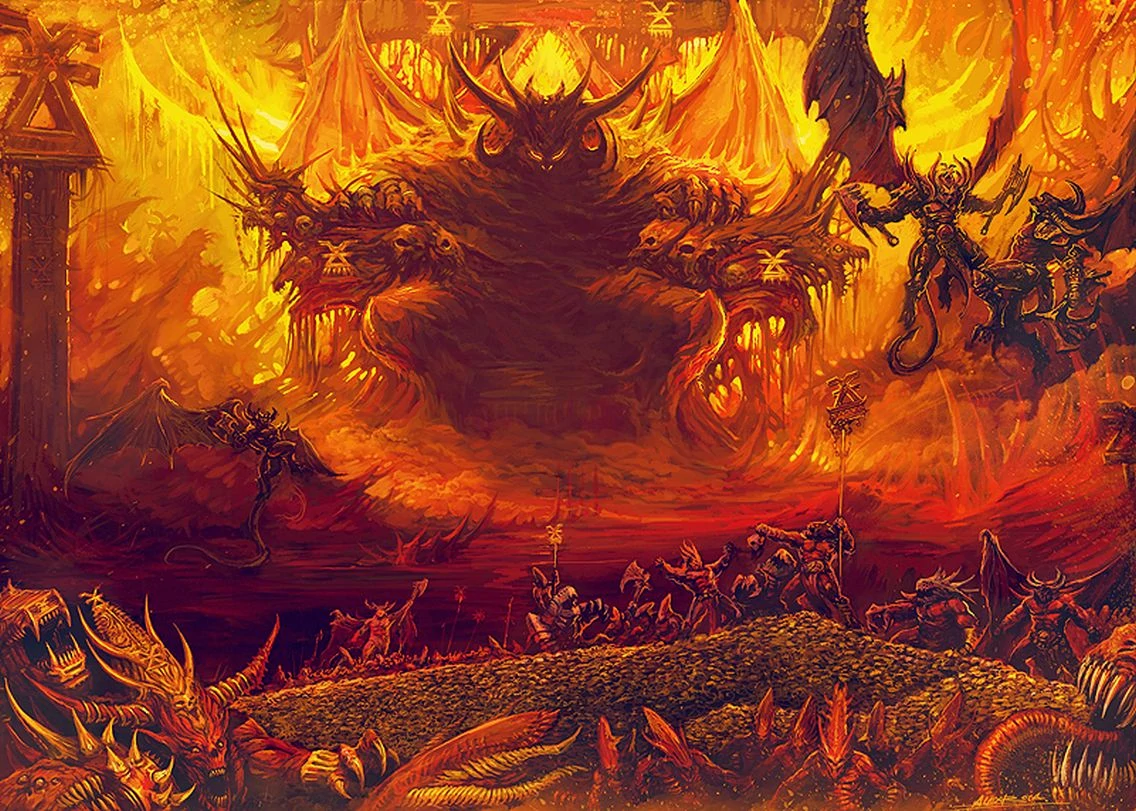
The name "Khorne" derives from his name in Chaos' daemonic Dark Tongue, Kharneth, meaning "Lord of Rage" or "Lord of Blood". He is the mightiest and the oldest of the four major Chaos Gods, fully coming into existence in the Immaterium sometime during Terra's European Middle Ages in the early 2nd Millennium, his birth heralded by an era of wars and conflict that raged across the globe. Khorne is the Blood God, Lord of Rage, Taker of Skulls. He is wrath incarnate, the embodiment of a never-ending lust to dominate and destroy. It is his sole desire to drown the galaxy in a tide of slaughter, to conquer and kill every living thing until there is nothing left but spilt blood and shattered bone. The Blood God is commonly depicted as a broad and muscular humanoid who stands hundreds of feet tall. He has the face of a savage, snarling dog, though his twisted features are all but hidden by a baroque helm decorated with the skulls of conqueror kings. Khorne's exaggerated physique is further distorted by heavy, overlapping plates of armour fashioned from brass and blackened iron. His every word is a growl of endless fury, and his roars of bloodlust echo across his realm.
Slaanesh
Slaanesh, also known as the Dark Prince the Prince of Pleasure, the Lord of Excess, the Perfect Prince, and even the Prince of Chaos in the Imperium of Man, is the Chaos God of pleasure, excess and decadence. Lust, pride and self-indulgence are the hallmarks of all who follow him. He is the youngest of the four major Chaos Gods, having come to full sentience within the Immaterium only during the 30th Millennium. While generally referred to as a "he" by humans and as a female by the Aeldari, Slaanesh is actually neither gender, combining characteristics of both and perfecting them.
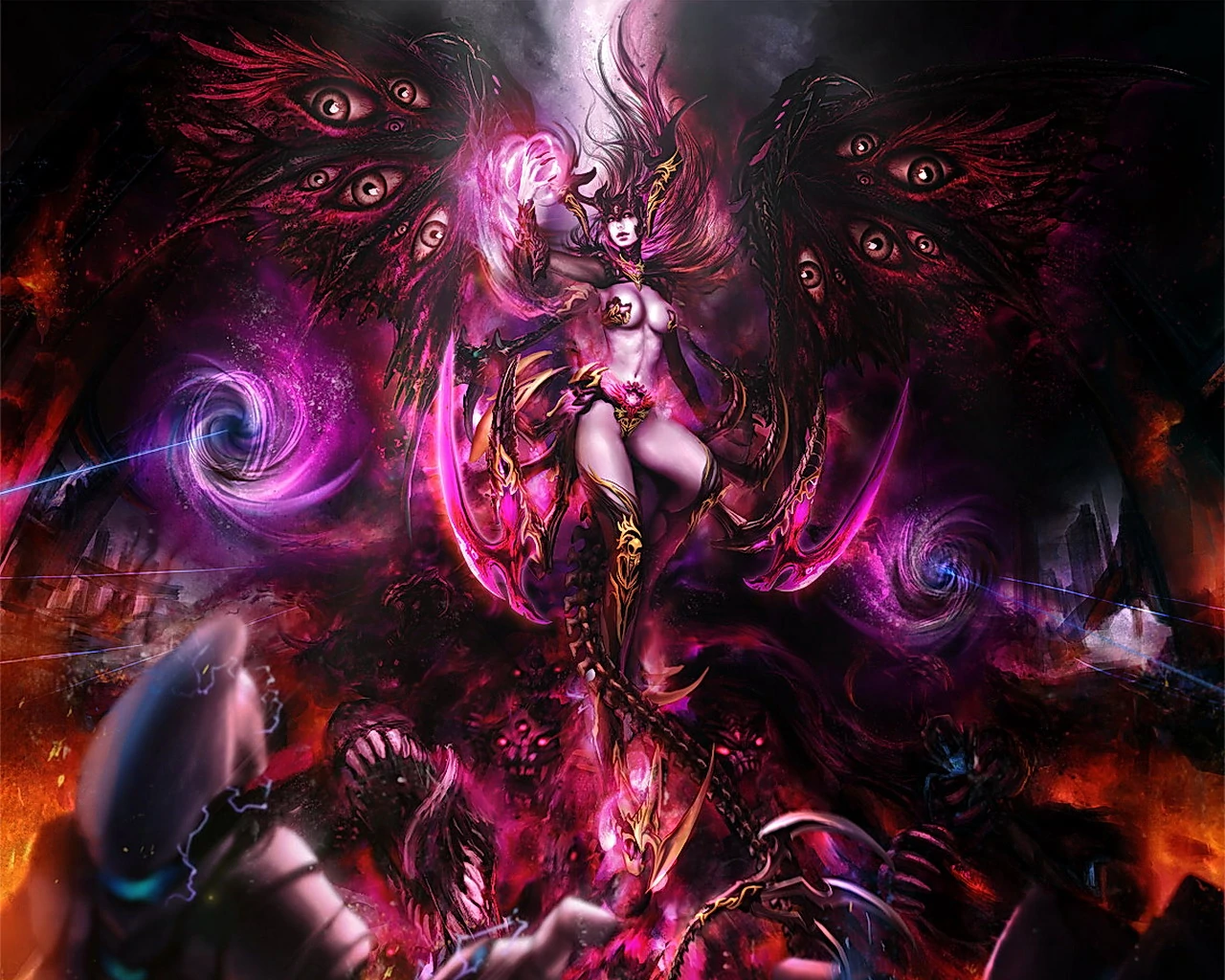
Slaanesh typically appears in an androgynous form in which it is a woman on the right side and a man on the left with two sets of devilish horns growing from its head. Slaanesh can assume any form; male, female, hermaphrodite or no gender at all, but it prefers male bodies. Its sacred number is six and the colours associated with Slaanesh are purple, pink and black. The name Slaanesh is a corruption of the Aeldari term Slaaneth (Slaa meaning "ecstasy" or "pleasure" and Neth meaning "lord" or "prince" in the Aeldari Lexicon; hence, the Prince of Pleasure), though ironically, the Aeldari refer to this foul entity only as Sai'lanthresh in the Aeldari Lexicon, "She Who Thirsts."
Slaanesh is the Lord of Pleasure, the Dark God dedicated to the pursuit of earthly gratification and the overthrow of all decent behaviour, as well as hedonism and pleasure for its own sake. He is the god of obsession, the Master of Excess in All Things, from gluttony to lust to megalomania. Wherever mortals are ruled by their own unquenchable desires, the Dark Prince of Chaos is there in the shadows, whispering, tempting, and feasting on a banquet of souls. But this is true in all things, not just carnal pleasures. Those who desire to indulge in the finest culinary delights, the most beautiful artworks, even the most sensual clothing, could all be amongst Slaanesh's disciples. Just as importantly, Slaanesh is also the god of perfection. The singer striving for the most beautiful song or the warrior who seeks the perfect fighting techniques, both could be devotees of Slaanesh.
Nurgle
Nurgle, also known as the Plague Lord is the Chaos God of disease, decay, death and destruction. In particular, the emotion of despair in mortals empowers him. He is known also as "Grandfather Nurgle," the "Lord of Pestilence" and the "Lord of Decay." He is the third of the Chaos Gods to fully awake within the Warp, emerging during the 2nd Millennium in the midst of Terra's European Middle Ages, as great plagues swept across the world heralding his birth.
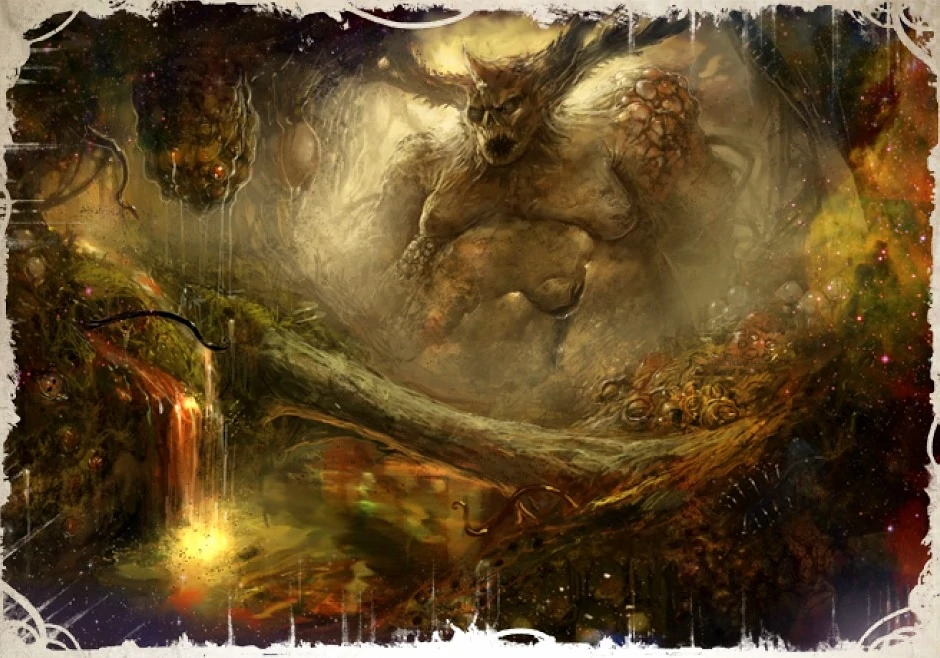
Nurgle is the Great Lord of Decay and the Master of Plague and Pestilence. All things, no matter how solid and permanent they seem, are liable to eventual corruption and death. Even the process of creation is but the precursor to destruction and decay. The bastion of today is tomorrow's ruin, the maiden of the morning is the crone of the night, and the hope of a moment is but the foundation of regret. Though he is the creator of every infection and epidemic to have ever swept the universe, Nurgle is not a morose purveyor of despair and gloom, but a vibrant god of life and laughter. In death, there is life. Upon the decay of the living untold numbers of bacteria, viruses, insects and other carrion-feeders thrive. All life feeds upon other life to exist, and from every plague grows new generations, stronger and more virile than those who came before. Regeneration comes from decay, just as hope springs from despair. The greatest inspiration comes in the darkest moments; in times of crisis mortals are truly tested and driven to excel.
To understand what might otherwise seem contradictory or even perverse in nature, one must first comprehend that which Nurgle embodies. On the one hand, he is the Lord of Decay, whose body is wracked with disease; on the other, he is full of unexpected energy and a desire to organise and enlighten. The citizens of the Imperium know full well that their lives will end one day and that many of their number will live with disease or other torments in the meantime, yet they drive this knowledge deep into the corners of their minds and bury it with dreams and ceaseless activity.
Tzeentch
Tzeentch, also known as the Changer of Ways, and the Architect of Fate, is the Chaos God of change, evolution, intrigue and sorcery, he who weaves the threads that connect every action, plot and subtle intrigue in a galaxy-wide game of manipulation and subterfuge.
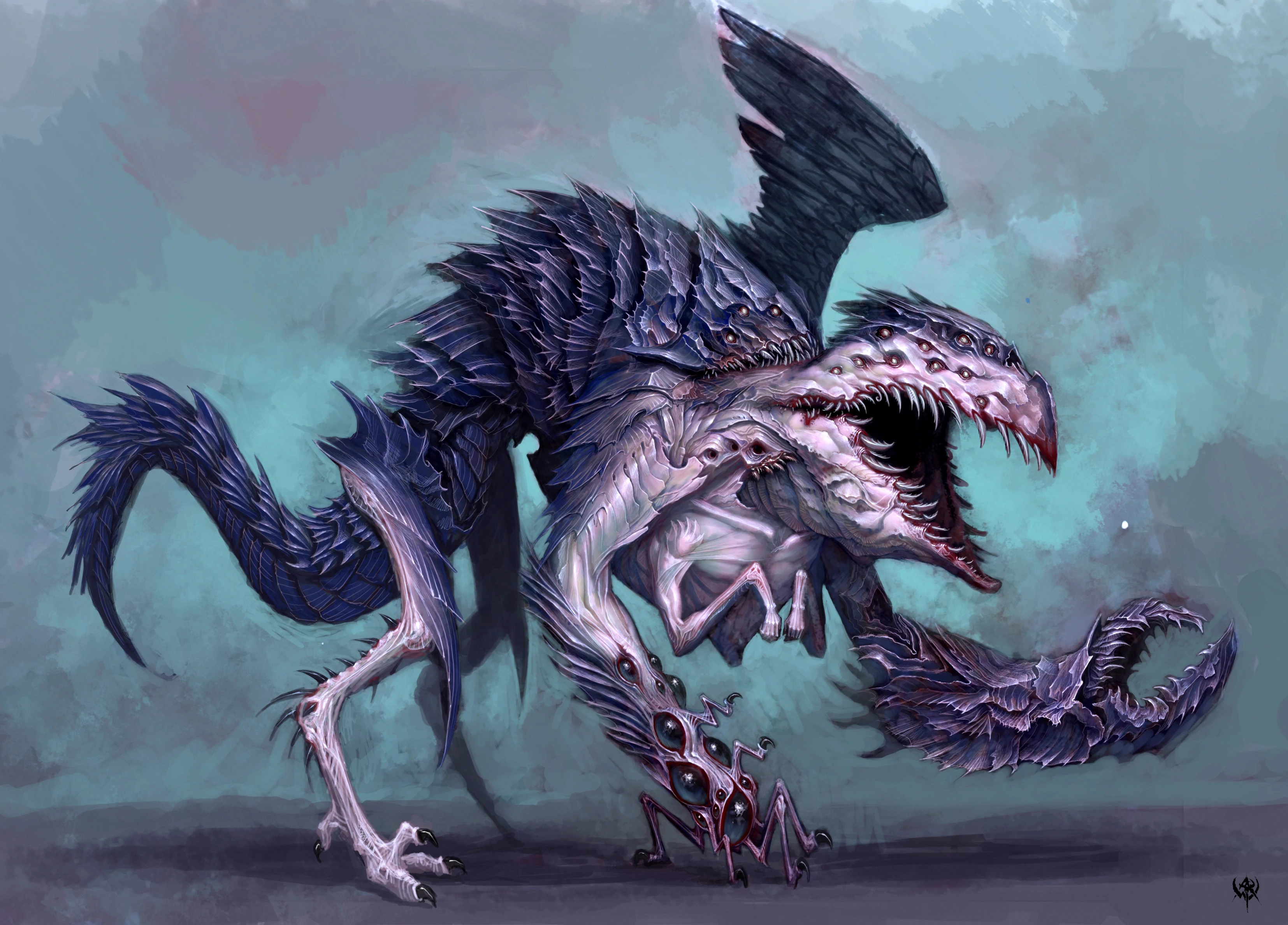
Tzeentch is known by a hundred thousand titles across the galaxy, amongst them the Weaver of Destinies, the Great Conspirator, and the Architect of Fate. In his mind, he listens to the hopes of every sentient being from every planet in the universe. He watches over the plans of his playthings as they unfold into history, toying with fate and fortune; both for his own entertainment and to further his unfathomable schemes. Tzeentch feeds upon the need and desire for change that is an essential part of all life in the universe. All people dream of prosperity, freedom and a better tomorrow. These dreams are not just the preserve of the impoverished or the powerless -- even Imperial Planetary Governors and Imperial Navy battlefleet admirals dream of further riches, or perhaps even an end to their responsibilities to the Emperor.